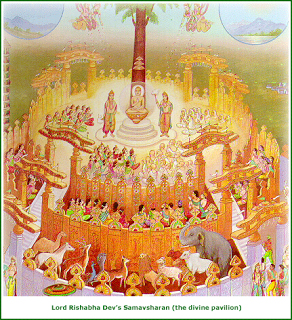
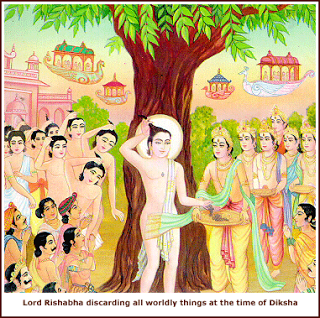
Bhagwan Rishabh Dev Ji
| Father's name | Nabhi Rai |
| Mother's name | Marudevi |
| Birth place | Ayodhya (UP, India) |
| Wives | Devi Sumangla, Devi Sunanda |
| Children | Bharat, Bahubal, 100 sons, 2 daughters |
| Color | Golden |
| Symbol | Ox/Bull |
| Life Span | 84 Lakhs Purva |
| Place Of Nirvan | AshtaPadh (Kailash) |
Previous Births of Rishabha Dev
In his previous incarnation, Lord Rishabha Dev was in the mahavideh shetra as Dhannaseth. He was a big business man. He offered alms and services to many ascetics and others.
Later he completed 7 births as Dev and humans. He was then born as Vaidya Jivanand in his 9th incarnation. As Vaidya Jivanand he discovered a medicine for pandu rog (a dreaded skin disease).
In his 11th incarnation he was born as Chakravarti King Vajranabh. As King Vajranabh he had supported poor and desolate masses. After many years of public service Vajranabh renounced the world and became an ascetic.
As a result of unprecedented spiritual practices, including religious studies, penance, tolerance, and meditation, he earned Tirthankar-nam-and-gotra-karma. These pious deeds of earlier births resulted in his taking birth as Rishabha Dev.
The Age of the Twins
During the first three Aras of the current descending cycle man was completely dependent on nature for all his needs. The wish-fulfilling trees provided all that he needed. Man was simple, peaceful and contented in attitude. The environment was absolutely unpolluted. Water was tasteful, cold, and sweet. Even the sand was sweet as sugar. The air was healthy and exhilarating. The grains and fruits were nutritious and filing. A simple meal of little quantity of fruit and water lasted for days. Filled stomach and satisfied desires acted as antidote to irritation and reduced disputes and other sinful activities. The whole animal kingdom lived in harmony with the nature.
With the passage of time gradual changes occurred and around the end of the third Ara the yield from the Kalpa-vrikshas reduced. The alround deterioration in conditions spelled the beginning of quarrels and disputes. To guard against these disputes and to live in peace and harmony, man formed groups and the Kulkar system was evolved. A number of people collected to form a ‘Kula’ (family) and the head of the group was called ‘Kulkar’. It was the duty of the ‘Kulkar’ to remove discord and establish order. Nabhiraja was the seventh and the last in the line of Kulkars. His wife was Marudevi. This epoch of Kulkar system was known as the epoch of twins (Yugalia). A human couple used to give birth to twins - one male and one female. This twin would become husband and wife on reaching adulthood. The twins used to lead a happy and contented life and died a natural death together.
To consume what was available was the way of life. As such this period was also known as Bhog-Bhumi-Kaal or the era of free consumption. Up to the time of Kulkar Nabhiraja man lived in this land of abundance.
Birth of Lord Rishabha Dev
It was during the last part of the third Ara of the current descending cycle of time that the great and pious soul that was to become Rishabhdev descended into the womb of Marudevi on the fourth day of the dark half of the month of Ashadh (according to the Hindu calendar) during the night. When this pious soul was conceived, mother Marudeva dreamt of fourteen (sixteen according to Digambara Jain Sects) auspicious things. Nabhiraja was an experienced and scholarly person. When he heard about these dreams from Maudevi, he said, "Devi! You will give birth to a highly endowed soul who will show the path of peace and happiness to this world"
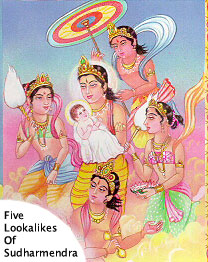 Five look alikes of Saudharmendra
Five look alikes of Saudharmendra
On the eighth day of the dark half of the month of Chaitra, around midnight, healthy Marudevi gave birth to twins. This pious birth influenced the surroundings. The sky became filled with a soothing glow, the wind became fragrant and the whole atmosphere became impregnated with unprecedented joy that was hard to describe.
From all around came the fifty six goddesses of directions. They circumambulated the Tirthankar’s mother and bowed before her. They also sang in praise of the child that was to become Tirthankar and then proceeded to perform post-birth cleaning rituals.
At that instant the king of gods of the Saudharm dimension, Saudharmendra Shakra, also came to know that the first Tirthankar has taken birth. He arrived with his large retinue of gods and, bowed before the mother.
After the salutations the mother was put to sleep. Saudharmendra created five look alike bodies of himself. With one body he carefully lifted the baby in his hands. With the second body he took an umbrella in his hands and stationed the body behind the baby. With the third and fourth bodies he took whisks and stationed these bodies on both sides of the baby. With the fifth body he lifted his divine weapon, Vajra, and stationed himself ahead of the baby as a body guard. In this formation the king of gods airlifted the baby to Meru mountain. There, all gods, including their 64 kings with their consorts, ceremoniously performed the post-birth anointing rituals. This ceremony, popularly known as Janma-kalyanaka, of a Tirthankar, is unparalleled in this world.
Naming Ceremony
Next morning Nabhiraja organized the birth celebrations. He invited his friends and relatives to a feast and announced, "As there is a sign of a bull on the thigh of the new born, and Marudevi first of all saw a bull in her great dreams, we name this child as ‘Rishabha Kumar’." His twin will be known as "Sumangala".
The Beginning of the Ikshvaku Clan
When Rishabha Kumar was one year old, Saudharmendra came to Kulkar Nabhi for formalizing the family name. He carried a sugar-cane in his hand Baby Rishabha was sitting in his fathers lap. When he saw the sugar-cane he eagerly extended his tiny hands to grab it. Saudharmendra gave the sugar-cane to the baby and seeing his affinity for sugar-cane (Ikshu) he formally named the family as Ikshvaku.
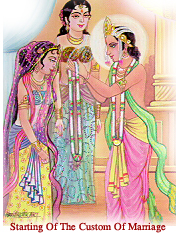 Marriage
Marriage
Rishabha Kumar was married to a girl named Sunanda whose twin died in an accident. This was the beginning of the marriage system. He was also married to his twin Sumangala in a ceremony that was arranged by the gods. Prince Rishabha led a happy married life. In due course Sumangala gave birth to Bharat, Brahmi and ninety eight other sons. Sunanda gave birth to Bahubali and Sundari.
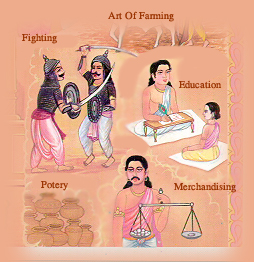 Evolution of Crafts and Trades
Evolution of Crafts and Trades
Prince Rishabha was a highly endowed, farsighted and industrious individual. He had a profound insight into the human psychology. Looking at the needs the times and society he evolved numerous arts, crafts and trades and taught them to people with right aptitude and physical and mental capacities. To some he taught farming and to others the trade of agricultural produce. He invented the alphabets, language, and the numbers along with the tools for writing. Brahmi lipi, named after her daughter is still not a forgotten thing. For self defense he evolved martial arts and taught these to individuals with strong physique. He also established systems of social security and penal codes. Pottery, architecture, music, dance, and many other arts and crafts that enriched the human society in the fields of knowledge, arts, entertainment, administration, etc. are said to be his contributions.
Rishabha Dev as a king
Slowly and steadily king Nabhi started putting major responsibilities of his Kingdom on Rishabha dev. Such was the effect of Rishabha dev's words, that by just saying, "Oh! Man! You should have not done this, the culprit felt ashamed and stopped his bad works immediately. When Nabhi Raja saw that Rishabha dev has taken all the responsibilities of kingdom and performing them very well. Infact he seemed to have become idol of people. He then one day, on the request of the people’s representatives, nominated Rishabha to become the first king of this age. He arranged for an elaborate coronation ceremony and handed over the reigns of the state to Rishabha Kumar. The ceremony was attended by all members of the family, large number of twins, and gods. The gods created a golden throne and anointed Rishabha with the water collected from various pilgrimage centres. They attired him in divine dress and ornaments and formally put the crown on his head. The twins humbly poured water on his feet from the cups made of lotus leaves. Rishabha became the first king of this era. The king of gods ordered Kuber, the god of wealth, to construct a suitable city. This beautiful city was named Vinita; later on it became popularly known as Ayodhya.
Now, king Rishabhdev became busy. All day long he remained busy in the work of his kingdom, but during night he use to meditate. His tolerance broke off one day. He gave the responsibility of the entire kingdom to his son Bharat and Bahubabi and rest 98 sons. This pious soul was not meant for his own kingdom, infact he had took birth for the welfare of entire human community and he very well realized it.
Diksha
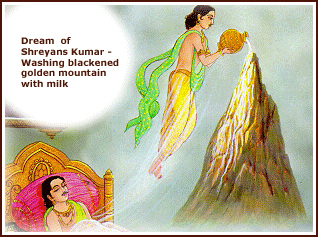 As time passed by, the other saints with him felt very weak - physically as well as mentally, and decided to take fruits and vegetables naturally available. They slowly drifted away from Rishabh Dev or in other words away from true ascetic way. But Rishabh Dev - what can move him? He kept on wandering without food without water. After one year he reached to Hastinapur and decided to beg for food again.
As time passed by, the other saints with him felt very weak - physically as well as mentally, and decided to take fruits and vegetables naturally available. They slowly drifted away from Rishabh Dev or in other words away from true ascetic way. But Rishabh Dev - what can move him? He kept on wandering without food without water. After one year he reached to Hastinapur and decided to beg for food again.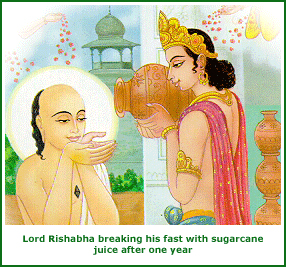 Bahubali's son Somprabh, was the king of Hastinapur at that time. His son Shreyans Kumar had dreamt last night that he had turned the blackened golden mountain back to life by washing it with milk. He was sitting in his balcony thinking about this unusual dream when he saw Rishabh Dev entering the town accompanied by localized. He rushed to welcome his great grandfather and as soon as he bowed to him and looked at him he got 'Jati Smaran Jnan' - knowledge of past births. He realized that in his previous birth he was charioter to king Vajranabh (what Rishabh dev was in his previous birth). He became aware of his duty and requested Rishabh dev, "Bhagwan! I have just received 108 pitchers full of fresh sugar cane juice. It is pure and untouched and suitable for you in all respects. Kindly accept it and break your fast." As soon as Rishabh Dev took the first sip the atmosphere bloomed with fragrance and doll drums all around. Rishabh Dev got his first real charity and this was also the beginning of the tradition of giving charity and alms.
Bahubali's son Somprabh, was the king of Hastinapur at that time. His son Shreyans Kumar had dreamt last night that he had turned the blackened golden mountain back to life by washing it with milk. He was sitting in his balcony thinking about this unusual dream when he saw Rishabh Dev entering the town accompanied by localized. He rushed to welcome his great grandfather and as soon as he bowed to him and looked at him he got 'Jati Smaran Jnan' - knowledge of past births. He realized that in his previous birth he was charioter to king Vajranabh (what Rishabh dev was in his previous birth). He became aware of his duty and requested Rishabh dev, "Bhagwan! I have just received 108 pitchers full of fresh sugar cane juice. It is pure and untouched and suitable for you in all respects. Kindly accept it and break your fast." As soon as Rishabh Dev took the first sip the atmosphere bloomed with fragrance and doll drums all around. Rishabh Dev got his first real charity and this was also the beginning of the tradition of giving charity and alms.